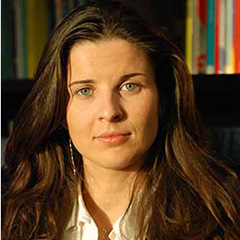Afferenza
Ricevimento e Altre Informazioni
Venerdì ore 14.30 ufficio 212 Campus Perrone, Novara (previo appuntamento via email).
Didattica
CV
Pubblicazioni
Ricerca
Transizione di carriera: da manager a imprenditore. Questa ricerca si concentra sul mercato del lavoro
italiano e si propone di esplorare le condizioni istituzionali, sociali,
educative, culturali e individuali come l’esperienza, le attitudini e
competenze che favoriscono il passaggio dal ruolo manageriale a quello
d’imprenditore.
Managerializzazione delle imprese familiari. L’obiettivo principale di questa ricerca è
comprendere i rapporti esistenti tra i differenti strumenti di controllo
manageriale presenti nelle imprese familiari e le loro determinanti. A tal fine
l’approccio proposto da Simon viene rivisto per sviluppare un framework di
ricerca sui sistemi manageriali presenti nelle imprese familiari.
La gestione delle risorse umane nelle imprese familiari. La ricerca è indirizzata alla comprensione della relazione esistente tra formalità e informalità nelle politiche di gestione del personale nei diversi contesti aziendali. Si prefigge, inoltre, di analizzare l'impatto di differenti politiche di gestione del personale sulle performance economico-finanziarie e organizzative. Le principali teorie di riferimento considerate sono: Contingency Theory, Resource Based View e New Institutionalism, Company Growth Theory, Agency Theory, ed Equity Theory.
----------------------------------------------------------------------------------------------------------------------------------
Entrepreneurs from managers: Careers at the “intersection of societal
history and individual biography”. This research
focuses on the transition from managerial to entrepreneurial roles in the
current Italian setting and aims to explore the individual and contextual
conditions that foster this transition. In particular the work aims to explore
the contextual (institutional, social, educational, and cultural) and
individual conditions (experience, attitudes and competences) that foster this transition.
Managerialization of Family Businesses. The main
objective is to understand the intertwined relations between different types of
control in family business, and their determinants. Consistently with this
goal, the Simon’s approach is revisited to develop a research framework on the
MCSs in family business.
HRM Practices in Family Firms . The
objective of this research is to verify the internal determinants that lead a
family SME to implement professional practices of human resource management. We
distinguish between determinants related to family’s characteristics (family
involvement into governance and/or management, generation involved), and
organizational drivers (firm’s size, organizational structure’s typology). The
main theories used are Contingency Theory, Resource Based View e New
Institutionalism, Company Growth Theory, Agency Theory, Equity Theory.

